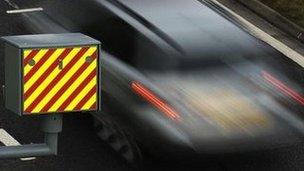Fixed Penalty Notice motoring fines may rise to £90
- Published

Fixed penalty notices are not available for the most serious offences such as speeding at over 100mph
Fines for motoring offences such as speeding should be increased from £60 to £90, the government suggested as it launched a consultation on the subject.
Transport Minister Mike Penning said current fines created a perception that the offences were "minor".
In future careless driving could also become a fixed penalty offence with a "remedial training" option, he added.
Educational courses for other offences, such as not wearing a seatbelt, could also be offered.
The government believes that the current regime for dealing with careless driving - defined in law as driving that "falls below what is expected of a competent and careful driver" - is overly bureaucratic.
Ministers are <link> <caption>seeking views from the public</caption> <url href="https://consultation.dft.gov.uk/dft/2012-25/consult_view" platform="highweb"/> </link> on the proposals, which would apply to England, Scotland and Wales, before deciding whether to pursue them.
Police catching careless drivers at present can issue them with a summons to court, but the government believes they are deterred from doing so by the "heavy burden of paperwork" involved.
'Trivial'
So drivers caught tailgating, braking suddenly, or passing a vehicle on the nearside might face a fixed penalty notice in future, like many speeders today.
In practice, drivers facing penalty notices are often given the choice to take a course instead - although they still have to pay the cost of the training.
The government believes careless drivers should also have this choice, and predicts that "approximately 3,000 offenders per year will attend remedial training".
The government estimates that the change would save the judiciary £5.53m, and the police £2.91m in administration costs and £9.5m in front-line costs, over the course of 10 years.
But it also foresees that revenue to the exchequer will fall by £4.41m over 10 years as fewer careless drivers face prosecution and the larger fines that can ensue, although it concedes there were "uncertainties" involved in the production of these figures.
Fixed penalty notices do not apply to the most serious driving offences, such as speeding at over 100mph or driving while drunk.
Similarly, drivers responsible for more serious examples of careless driving, such as those involving collisions, would not be given fixed penalty notices.
"If the FPN [fixed penalty notice] is set at a level lower than £90, there is a risk that the offence would be perceived as trivial and inconsequential," the consultation document warns.
It also notes that the fines have not risen since 2000, and have therefore diminished in value in real terms.
Fixed penalty notices for driving without insurance should also be raised, from £200 to £300, the document adds, "to reflect the seriousness of the offence".
The government does not think there is a need to change the level of parking fines.